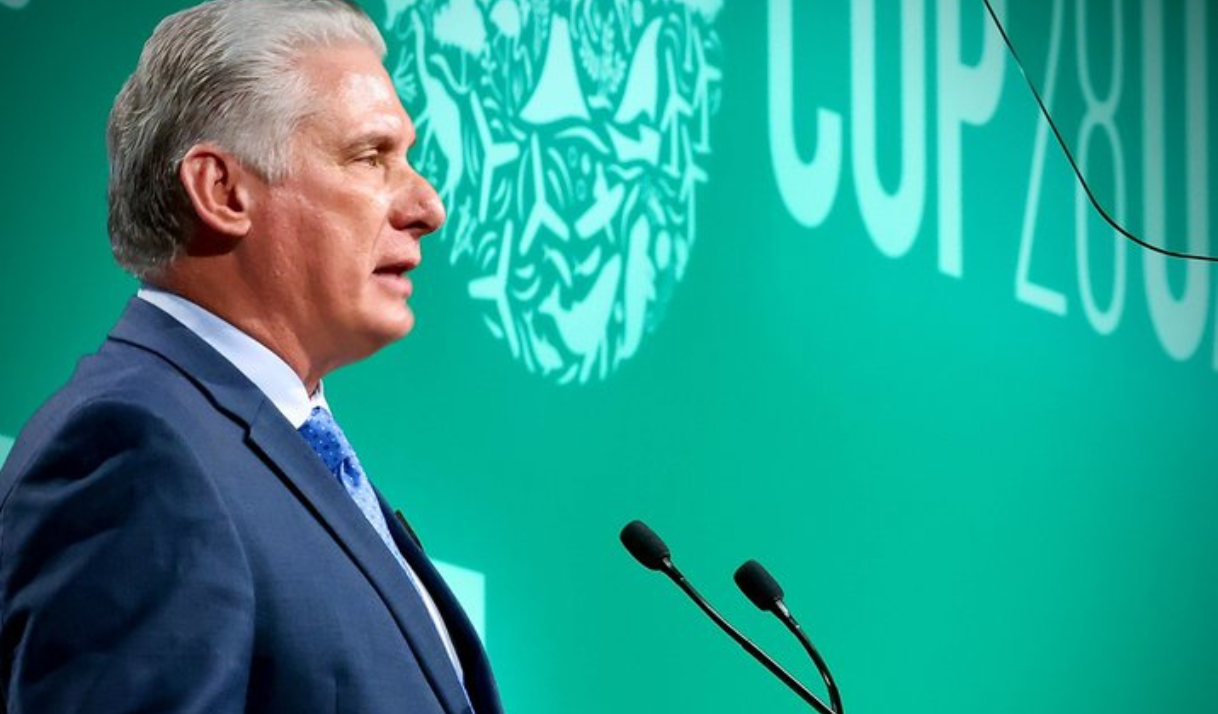
Photo: Alejandro Azcuy (Cuban Presidency).
The Cuban Government Admits Climate Change Impact
11 / diciembre / 2023
Miguel Diaz-Canel has spent over fifty days outside Cuba in the past year. On November 28, 2023, this number went up when he embarked on a visit to the United Arab Emirates, which was extended with his participation at the international UN Conference on Climate Change (COP28), in Dubai.
According to the UN, COP28 is a vital opportunity to take a step in the right direction and speed up actions that tackle climate chnge, especially given record temperatures worldwide and extreme weather events that affect the planet’s population.
This year, COP28, which takes place between November 30th until December 12th, was chaired by Sultan Al Jaber, the Minister of Industry and Advanced Technology in the Arab Emirates, one of the world’s top ten oil producers, and executive director of ADNOC, the United Arab Emirates’ state-led oil and gas company. Before the event, Al Jaber had made statements that put him on the side of climate change denial.
Cuba and climate change, what does the Government have to say about the future?
Countries in attendance at COP28, which form part of the United Nations Framework Convention on Climate Change and the Paris Agreement presented their commitment to reduce greenhouse gas emissions and adapt to climate impacts in one of the reports known as Nationally Determined Contribution (NDC).
In the Cuban Government’s first Nationally Determined Contribution (2020-2030), there is information about tackling the current situation and targets Cuba set in terms of climate change. Despite this being important information, it has had little public dissemination.
The report explains that water availability in the country has dropped by over 20% compared to 1990. The Government admits that there have been changes in rainfall patterns with more precipitation in the dry season, which has been an ongoing trend for decades; while rainfall is decreasing in the “wet months”.
Since 1960, there has a significant increase in the frequency and duration of drought, hitting the eastern region of the island the hardest.
The report forecasts a significant reduction in water potential at a national, regional and local level. Climate change’s impact on water resources is one of the greatest challenges, given water’s strategic importance in national development, especially in agriculture. Research indicates that usable water resources could only represent 60% of today’s amount.
Research carried out by the Cuban Government suggest that Cuba’s climate is evolving from a humid tropical country to a dry tropical country, with average temperatures of over 30°C, approximately 1000 mm of rainfall on average per year and 70 rainy days. These conditions will lead to migration from dry areas in the eastern region to other parts of the country.
It’s expected that national temperatures continue to rise, especially during the hottest season of the year, which could go up as high as 4.5 °C.
Can Cuba tackle climate change?
Measures proposed by the Cuban Government to tackle the climate crisis include several restrictions such as the ban on new construction projects in coastal settlements threatened by permanent flooding and considered the most vulnerable. Keeping in line with this, they seek “to reduce the demographic density in low-lying areas near the coast.”
Despite these measures having an “environmental” justification, coastal areas have been identified as particularly important areas for tourism. Settlements have been destroyed in these areas and the local population has been displaced.
These decisions pose questions about the co-existence of environmental and development strategies that demonstrate the complexity of environmental preservation with the Government’s economic and tourism needs.
Another measure Cuba has to tackle the water crisis is “to ensure the availability and efficient use of water as a way to tackle drought, using technology to save water and meet local consumption demands. Increasing hydraulic infrastructure and maintenance work, as well as implementing actions to measure water efficiency and productivity.”
However, in October 2023, Antonio Rodriguez, president of the state-led National Institute of Hydraulic Resources (INRH) admitted that “leaks were very detrimental” in Cuba right now.
The official recognized that they were using “energy and chemical products without the result they need, as well as it being demotivating for people, it’s hard to ask somebody to save water when there is a leak in front of their house for days and months. There are over 4000 leaks across the country today. We had more than 7600. There were over 2000 leaks in Havana alone, and we had as many as 3700.”
Rodriguez also admitted that the INRH needs to replace between 8%-10% of pumping equipment; and pointed out that there is a deficit of proper machinery in 89 locations, statistics that offer a limited view of the island’s complex management of its water supply.
Similarly, the Cuban Government recognized in its report that “Cuba’s contribution to global greenhouse gas emissions is minimal.” A statement that doesn’t exactly prove Cuba’s commitment to reducing these kinds of emissions, but rather the poor state of Cuban industry and the economy in general.
Further proof of this is the Government’s recognition that 70.5% of the world’s gross greenhouse gas emissions come from the energy sector, and 20.1% come from agriculture and livestock. They even propose to cut back on greenhouse gas emissions from the swine sector by 2030, which created the most greenhouse gas emissions at the time the report was written.
Nevertheless, pork production in Cuba has dropped by 90% since 2018, and this hasn’t been thanks to the Cuban Government’s actions to tackle climate change.
This article was translated into English from the original in Spanish.


If you believe that our journalism is important for Cuba and its people, we want you to know that this is a critical moment.
Behind each publication there is a team that strives to ensure that our products meet high quality standards and adhere to professional and ethical values.
However, to keep a close watch over government, demand transparency, investigate, analyze the problems of our society and make visible the hidden issues on the public agenda is an effort that requires resources.
You can contribute to our mission and that is why today we ask for your help. Select the way you prefer to send us a donation.








comments
We moderate comments on this site. If you want to know more details, read our Privacy Policy
Your email address will not be published. Mandatory fields are marked with *